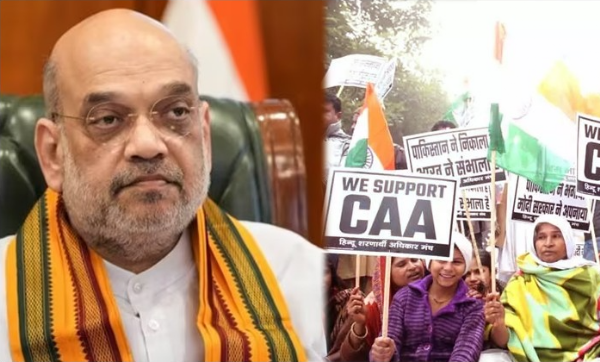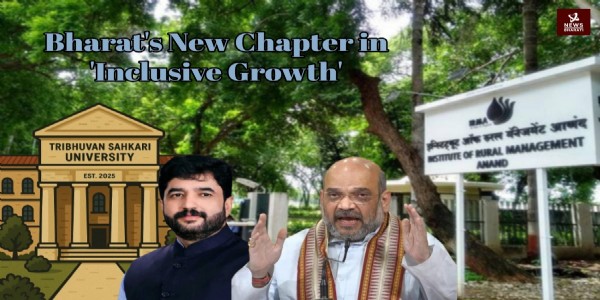CAA rules: From eligibility to the process of getting citizenship, here's all you need to know about-
Total Views | 232
New Delhi, Mar 12: The BJP-led central government implemented the Citizenship (Amendment) Act, 2019, four years ahead of the upcoming Lok Sabha Elections 2024.

The new rules state that those applying for Indian citizenship will have to submit two special documents. An Indian citizen will have to testify as to the character of the applicant via an affidavit. The applicant must have adequate knowledge of one of the languages listed in the Eighth Schedule of the Constitution.
"The application from a person for grant of citizenship by naturalisation fulfilling the qualifications for naturalisation under the provisions of the Third Schedule, is submitted in Form VIIIA which includes –
an affidavit verifying the correctness of the statements made in the application along with an affidavit from an Indian citizen testifying the character of the applicant.
a declaration from the applicant that he has adequate knowledge of one of the languages as specified in the Eighth Schedule to the Constitution.
• A copy of the passport issued by the government of Afghanistan, Bangladesh, or Pakistan.
• Registration certificate or residential permit issued by the Foreigners Regional Registration Officer (FRRO) or Foreigners Registration Officer (FRO) in India.
• Birth certificate issued by a government authority in Afghanistan, Bangladesh, or Pakistan.
• School certificate or educational certificate issued by the School, College, Board, or University authorities in Afghanistan, Bangladesh, or Pakistan.
• Identity document issued by the government of Afghanistan, Bangladesh, or Pakistan, or any other government authorities or agencies in these countries.
• Any licence or certificate issued by a government authority of Afghanistan, Bangladesh, or Pakistan.
• Land or tenancy records in Afghanistan, Bangladesh, or Pakistan.
• Any document indicating that the applicant's parents, grandparents, or great-grandparents were citizens of Afghanistan, Bangladesh, or Pakistan.
• Any other document issued by a government authority or agency in Afghanistan, Bangladesh, or Pakistan establishing the applicant's nationality.
• It's noted that these documents remain admissible even beyond their validity period as per the notified rules.
1. Submission of Application: The applicant must submit an application for registration or naturalisation under section 6B in electronic form to the Empowered Committee through the District Level Committee designated by the Central government, as per the gazette notification.
2. Document Verification: The District Level Committee, headed by the Designated Officer, shall verify the documents submitted by the applicant along with the application.
3. Oath of Allegiance: The Designated Officer shall administer the oath of allegiance to the applicant as specified in the Second Schedule to the Citizenship Act, 1955. Subsequently, the Designated Officer will sign the oath of allegiance and forward it electronically, along with confirmation regarding document verification, to the Empowered Committee.
4. Non-Appearance of Applicant: If the applicant fails to appear in person to subscribe the application and take the oath of allegiance despite reasonable opportunities, the District-Level Committee will forward the application to the Empowered Committee for consideration of refusal.
5. Scrutiny by Empowered Committee: The Empowered Committee referred to in rule 11A will scrutinise the application to ensure completeness and verify that the applicant satisfies all conditions laid down in section 6B.
6. Grant of Citizenship: Upon being satisfied after necessary inquiry regarding the suitability of the applicant, the Empowered Committee may grant citizenship of India through registration or naturalisation.
Areas Covered by Sixth Schedule: The amendments introduced by the CAA do not extend to regions governed by the Constitution's sixth schedule. These areas, found in Assam, Meghalaya, Tripura, and Mizoram, are autonomous tribal-dominated regions. Migrants belonging to identified communities from Afghanistan, Bangladesh, and Pakistan based on religion cannot obtain Indian citizenship if they reside in these areas.
States with Inner-Line Permit (ILP) Regime: The CAA also does not include states with an inner-line permit (ILP) regime, primarily located in north-east India. The ILP is a special permit required for non-residents to enter and reside in these states for a limited duration. States where the ILP system is operational include Arunachal Pradesh, Mizoram, Nagaland, Manipur, Lakshadweep, and Himachal Pradesh.
The CAA paves the way for citizenship to undocumented non-Muslim migrants from Pakistan, Bangladesh and Afghanistan who came to India before December 31, 2014. With this, the Modi government will now start granting Indian nationality to persecuted non-Muslim migrants -- Hindus, Sikhs, Jains, Buddhists, Parsis and Christians -- from the three countries.

Here is all you need to know about the eligibility, procedure, and special clauses of the CAA rules
Who can apply for citizenship under Section 6B?
- The person is of Indian origin.
- The person is married to a citizen of India.
- The person is a minor child of a person who is a citizen of India.
- The person's parents are registered as citizens of India.
- The person or either of his parents was a citizen of Independent India.
- The person is registered as an Overseas Citizen of India Cardholder.
Special documents required with the citizenship application include:
The new rules state that those applying for Indian citizenship will have to submit two special documents. An Indian citizen will have to testify as to the character of the applicant via an affidavit. The applicant must have adequate knowledge of one of the languages listed in the Eighth Schedule of the Constitution.
"The application from a person for grant of citizenship by naturalisation fulfilling the qualifications for naturalisation under the provisions of the Third Schedule, is submitted in Form VIIIA which includes –
an affidavit verifying the correctness of the statements made in the application along with an affidavit from an Indian citizen testifying the character of the applicant.
a declaration from the applicant that he has adequate knowledge of one of the languages as specified in the Eighth Schedule to the Constitution.
Also Read: CAA rules notified! Modi govt fulfils another promise made in 2019 poll manifesto; Know what the Act says-
List of documents required to prove the applicant's nationality of Afghanistan, Bangladesh, or Pakistan:
• A copy of the passport issued by the government of Afghanistan, Bangladesh, or Pakistan.
• Registration certificate or residential permit issued by the Foreigners Regional Registration Officer (FRRO) or Foreigners Registration Officer (FRO) in India.
• Birth certificate issued by a government authority in Afghanistan, Bangladesh, or Pakistan.
• School certificate or educational certificate issued by the School, College, Board, or University authorities in Afghanistan, Bangladesh, or Pakistan.
• Identity document issued by the government of Afghanistan, Bangladesh, or Pakistan, or any other government authorities or agencies in these countries.
• Any licence or certificate issued by a government authority of Afghanistan, Bangladesh, or Pakistan.
• Land or tenancy records in Afghanistan, Bangladesh, or Pakistan.
• Any document indicating that the applicant's parents, grandparents, or great-grandparents were citizens of Afghanistan, Bangladesh, or Pakistan.
• Any other document issued by a government authority or agency in Afghanistan, Bangladesh, or Pakistan establishing the applicant's nationality.
• It's noted that these documents remain admissible even beyond their validity period as per the notified rules.
Also Read: Dewan of Ajmer Sharif's big message to Indian Muslims on CAA: "Why are Indian Muslims afraid, it is not for them"
As per the CAA rules, the procedure for application is outlined as follows:
1. Submission of Application: The applicant must submit an application for registration or naturalisation under section 6B in electronic form to the Empowered Committee through the District Level Committee designated by the Central government, as per the gazette notification.
2. Document Verification: The District Level Committee, headed by the Designated Officer, shall verify the documents submitted by the applicant along with the application.
3. Oath of Allegiance: The Designated Officer shall administer the oath of allegiance to the applicant as specified in the Second Schedule to the Citizenship Act, 1955. Subsequently, the Designated Officer will sign the oath of allegiance and forward it electronically, along with confirmation regarding document verification, to the Empowered Committee.
4. Non-Appearance of Applicant: If the applicant fails to appear in person to subscribe the application and take the oath of allegiance despite reasonable opportunities, the District-Level Committee will forward the application to the Empowered Committee for consideration of refusal.
5. Scrutiny by Empowered Committee: The Empowered Committee referred to in rule 11A will scrutinise the application to ensure completeness and verify that the applicant satisfies all conditions laid down in section 6B.
6. Grant of Citizenship: Upon being satisfied after necessary inquiry regarding the suitability of the applicant, the Empowered Committee may grant citizenship of India through registration or naturalisation.
There are certain exceptions where the CAA provisions do not apply:
Areas Covered by Sixth Schedule: The amendments introduced by the CAA do not extend to regions governed by the Constitution's sixth schedule. These areas, found in Assam, Meghalaya, Tripura, and Mizoram, are autonomous tribal-dominated regions. Migrants belonging to identified communities from Afghanistan, Bangladesh, and Pakistan based on religion cannot obtain Indian citizenship if they reside in these areas.
States with Inner-Line Permit (ILP) Regime: The CAA also does not include states with an inner-line permit (ILP) regime, primarily located in north-east India. The ILP is a special permit required for non-residents to enter and reside in these states for a limited duration. States where the ILP system is operational include Arunachal Pradesh, Mizoram, Nagaland, Manipur, Lakshadweep, and Himachal Pradesh.
Bharati Web






